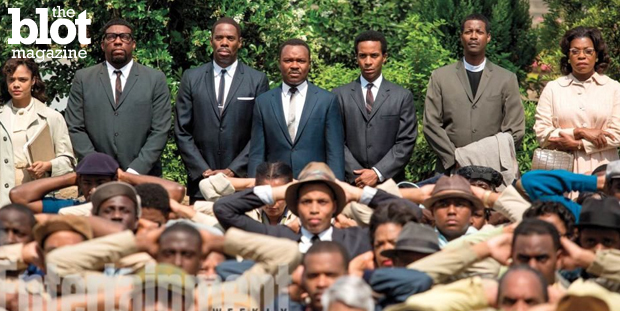Director Ava DuVernay’s “Selma” is a biopic of Martin Luther King Jr.’s involvement in the 1965 Selma to Montgomery voting rights marches and the struggle for civil rights in the Deep South. But the fact that the movie was shutout of a Golden Globe win — and DuVernay was very noticeably absent from the just-announced Oscar nominations in the Best Director category — forces “Selma” to be front and center in Hollywood’s ugly lack of diversity and the homogenous makeup of voters for the Academy Awards.
If DuVernay was nominated, it would have marked the first time a female African-American director got the nod. It’s a shame that she wasn’t, and the Academy missed an opportunity. Not only an opportunity to recognize an important piece of filmmaking, but to celebrate and honor the diversity of filmmakers and their contributions as well.
After the Oscar nominations were announced Thursday, the public reacted on the Internet and social media, making the hashtag #oscarssowhite a trending topic.
Wes Andersons’ “The Grand Budapest Hotel” received nine total nominations, “Selma,” just two. Congratulations on Anderson’s first Best Director nod, but wow, how are people not tired of this shtick of intentionally offbeat, quirky films which really aren’t about anything?
Maybe voters were tired of films about race and politics. After all, “12 Years a Slave” won Best Picture last year, but are so-called “black” movies being tokenized to a degree?
It’s possible that there is a racial and political hangover, and voters opted for the lighter choices like “The Grand Budapest Hotel” and “Birdman” because of the tumultuous events of 2014 which included the tragic deaths of Michael Brown and Eric Garner. Considering the protests and civil unrest that followed, culminating with two NYPD police officers being assassinated while sitting in a patrol car in Brooklyn, maybe there is some fatigue with serious films. But that’s not a good reason to shutout a fine piece of work that deals directly with many of these same issues, albeit 50 years later.
Read more: ‘Selma’ Reminds Us That Violence Isn’t the Answer
Apparently the Hollywood shuffle continues, and it really should not be that much of a surprise considering the mostly older, white and male slate that votes for the Oscars. An LA Times report in 2012 found a serious lack of diversity within the Oscar voters. There were nearly 6,000 voters for the awards, and in 2012, 93 percent were white, 76 percent were men and the average age of voters was 63.
(I’ll let that sink in for a minute.)
Since 2012, the Academy has invited more members and claims a diverse group of voters is a priority. It also revised its voter quota system, inviting in more voters than had passed away or were no longer active, which was the process to replace previously. So these numbers may have changed a bit, but it’s still an embarrassment.
When will this country get to a place where there aren’t “black” movies, just good stories to tell? Like actor and activist Edward James Olmos said in a recent interview with our Dorri Olds, “There is only one race, and that’s the human race.” “Selma” is certainly one of those good stories, regardless of whether it portrays President Lyndon B. Johnson as sympathetic or helpful enough to the struggle for civil rights.
Did the film’s minor historical accuracies hurt its chances? Maybe, but probably not. Many, many historically based films have used artistic license to make a story more compelling by not following the history books word for word, yet they ended up big winners.
The real underlying problem is in the way Hollywood sees its marketing strategy to make films popular with the public. Movie executives and studio heads still have not realized for some reason that America is a country of diverse families and situations, and therefore continues to market for a black, Latino or white audience.
Only when Hollywood and its movers and shakers realize stories are the most important thing, and there really aren’t black or white movies, will there be a much greater diversity of stories told and perspectives appreciated.
Comedian, writer and director Robert Townsend, in his first major project, satirized the world of Hollywood in 1987’s “Hollywood Shuffle.” The movie is about a young black actor trying to break into movies without falling into stereotypical roles as a drug dealer, criminal or Eddie Murphy imitation. It seems, judging by the only two Oscar nominations for “Selma” (Best Picture and Best Original Song), that nearly 30 years after “Hollywood Shuffle” not much has changed. Hollywood continues to package and market movies — especially so-called “black” ones that deal with race or civil rights — into a buttonhole of being “black” even if a film speaks to a universal and relatable thing, like the struggle for civil rights.
Investing and inviting in a more diverse group of voters to add some color to the blank white slate clearly hasn’t worked. The Academy should seriously examine the process and who is invited to vote. It’s clearly not having the desired effect — or accurately representative of the United States of America of today.
Noah Zuss is a reporter for TheBlot Magazine.






